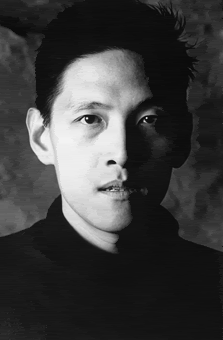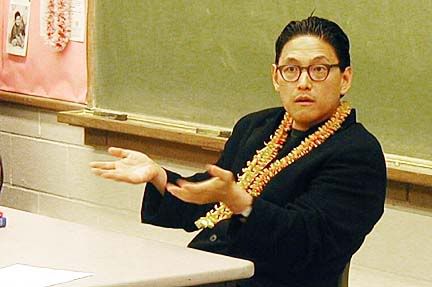Li Young Lee

Li-Young Lee is just two years younger than my mom. Which makes him seem pretty young to me.
His dad was Mao Tse Tung's physician. The family lived in Indonesia afterward for a while, until they had to flee because of anti-Chinese sentiments. According to some bigoraphies, the flight involved 5 years of moving to various places in Asia before they finally immigrated and settled in Pennsylvania. Lee grew up there, and attended a few prestigious universities in various parts of the US. Now, he is known for his poetry. He has published three books of poems, which have recieved many awards. His poems have been included in "the best of" anthologies.
He came to speak at BYU. I remember that he wore a soccer shirt with a suit coat over it. He looked so young, to me: just about as young as a college student. And yet his melancholy voice inflections and measured speech patterns made me look again-- examine those prominent cheekbones to see if he might be seventy at least.
One attractive trait of Lee's is that, contrary to the impression I had formed by viewing the artistically craggy, brooding-faced portraits of him, Lee does not take himself too seriously. He talked about how being a poet is sometimes incompatible with the interactions of daily life. One anectode he related began with his son taking piano lessons. His son's piano teacher gave him the "every good boy does fine" heuristic in order to memorize which musical notes rest on the lines of a musical staff. The boy was excited about what he had learned. He approached his dad (Li-Young Lee) and told him about his lesson that day.
Lee shook his head and said, "no, son; it goes like this: every wise child is sad." His wife, or a neighbor, or someone of the sort overhearing this scolded Lee, asking him how he could possibly tell a child such a depressing thing. Lee was puzzled. He hadn't thought it particularly depressing.
In addition to this, Lee joked that he likes to try to come up with greeting cards for hallmark, but for some reason they never use his ideas. To his surprise, death is not a popular subject for greeting cards.
Some say that the reason why Li-Young Lee' s poetry is so fluid has to do with his delight with the sounds associated with the English language, which were unfamilliar to him for a while. He plays with the sounds of words, making them work for him better than one who has become habituated to English and its beauties because it is the status quo- what we have learned from birth. Many of his poems are about this very subject-- foreignity. Many are also about his father, and his childhood. My favorite two poems:
A Story
Sad is the man who is asked for a story
and can't come up with one.
His five-year-old son waits in his lap.
Not the same story, Baba. A new one.
The man rubs his chin, scratches his ear.
In a room full of books in a world
of stories, he can recall
not one, and soon, he thinks, the boy
will give up on his father.
Already the man lives far ahead, he sees
the day this boy will go. Don't go!
Hear the alligator story! The angel story once more!
You love the spider story. You laugh at the spider.
Let me tell it!
But the boy is packing his shirts,
he is looking for his keys. Are you a god,
the man screams, that I sit mute before you?
Am I a god that I should never disappoint?
But the boy is here. Please, Baba, a story?
It is an emotional rather than logical equation,
an earthly rather than heavenly one,
which posits that a boy's supplications
and a father's love add up to silence.
-- Li-Young Lee, ©1990.
Early in the Morning
While the long grain is softening
in the water, gurgling
over a low stove flame, before
the salted Winter Vegetable is sliced
for breakfast, before the birds,
my mother glides an ivory comb
through her hair, heavy
and black as calligrapher's ink.
She sits at the foot of the bed.
My father watches, listens for
the music of comb
against hair.
My mother combs,
pulls her hair back
tight, rolls it
around two fingers, pins it
in a bun to the back of her head.
For half a hundred years she has done this.
My father likes to see it like this.
He says it is kempt.
But I know
it is because of the way
my mother's hair falls
when he pulls the pins out.
Easily, like the curtains
when they untie them in the evening.

His Bibliography:
Lee, Li-Young. 1986. Rose (Brockport, NY: BOA Editions, Ltd.)
Lee, Li-Young. 1990. The City in Which I Love You (Brockport, NY: BOA Editions, Ltd.)
Lee, Li-Young. 1995. The Winged Seed: A Rememberance (NY: Simon & Schuster)

0 Comments:
Post a Comment
<< Home